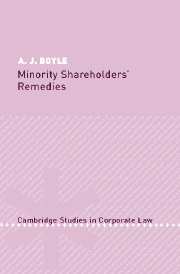1 - The rule in Foss v. Harbottle
Published online by Cambridge University Press: 11 July 2009
Summary
Introduction
This chapter is concerned with the rule in Foss v. Harbottle. The chapter explores the historical origins and subsequent evolution of a rule whose principal effect is to bar minority shareholders' actions. The treatment of minority actions by exception to the rule, or lying beyond its scope, is the subject-matter of Chapter 2. Chapter 3 is concerned with a proposed statutory derivative action. This is intended to reform defects in the common law shareholder's derivative action.
Inevitably, as part of the process of exploring the conceptual thinking on which the rule in Foss v. Harbottle rests, as well as the judicial policies it expresses, this chapter will begin to open up some of the themes that will be explored more fully in Chapters 2 and 3. Chapter 1 also explores the slow process of reforming the rule and the factors which appear to have inhibited both the judiciary and the Department of Trade and Industry in undertaking that task of reform. The particular difficulties that beset the use of the derivative action against directors and other wrongdoers in public listed companies are also considered in Chapter 1.
Relying on certain judicial decisions and dicta early in the last century, some academic writers have put forward a seemingly attractive solution to the problems posed by the rule in Foss v. Harbottle. This takes the form of invoking the provisions of the membership contract contained in what is now section 14 of the Companies Act 1985.
- Type
- Chapter
- Information
- Minority Shareholders' Remedies , pp. 1 - 23Publisher: Cambridge University PressPrint publication year: 2002



